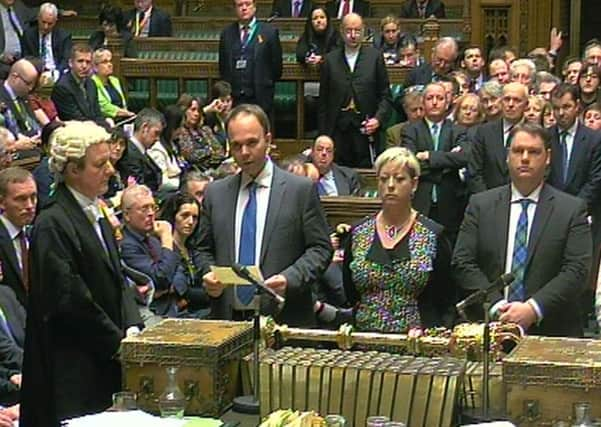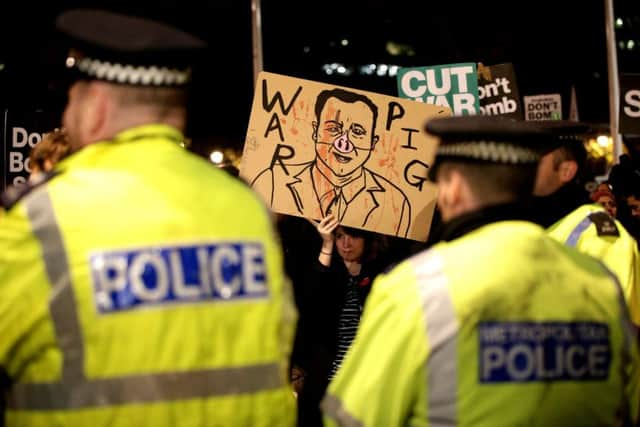MPs vote for air strikes in Syria


RAF jets and drones are ready to launch air strikes “very quickly” and raids on the jihadist terror group could begin within 24 hours, Foreign Secretary Philip Hammond said.
MPs voted by 397 to 223 in favour of extending British action to quash IS from Iraq into its Syrian strongholds - a majority of 174.
Advertisement
Hide AdAdvertisement
Hide AdDavid Cameron told the Commons the “women-raping, Muslim-murdering, medieval monsters” of IS were “plotting to kill us and to radicalise our children right now” as he laid out his case for intervention at the start of more than 10 hours of debate.


But critics of the plan disputed claims that 70,000 moderate fighters would be able to take on IS, also knowns as Isis, Isil and Daesh, on the ground.
Tory chairman defence select committee Julian Lewis warned warned that “instead of having dodgy dossiers, we now have bogus battalions of moderate fighters”.
Mr Hammond admitted the moderates were not a “homogeneous” group but insisted they were “all pointing their guns in the same direction”.
Advertisement
Hide AdAdvertisement
Hide AdAir strikes could be launched “very quickly”, the Foreign Secretary told Channel 4 News.
“Probably not tonight but it could be tomorrow night,” he added.
RAF Tornado GR4s, which carry a range of munitions including Paveway IV guided bombs and precision guided Brimstone missiles, based at the Akrotiri base in Cyprus are expected to carry out the first sorties against the extremists.
Mr Hammond said: “We are already flying reconnaissance missions over Syria. Our planes are carrying weapons over Syria into Iraq, so it would be a relatively simple exercise to extend the permissions to allow them to release those weapons over Syria where they identify legitimate targets.”
Advertisement
Hide AdAdvertisement
Hide AdWhile the often fractious debate continued inside the House of Commons thousands of anti-war protesters took to the streets outside chanting “David Cameron, shame on you” and “Don’t bomb Syria”.
Labour leader Jeremy Corbyn insisted Mr Cameron’s arguments for military action “simply do not stack up” and warned that air strikes would “almost inevitably lead to the deaths of innocents”.
The vote left Labour bitterly divided with MPs supporting the Government claiming they have faced an intense campaign of bullying and intimidation from some party members.
Pacifist Mr Corby opposes military action but was forced to offer his MPs a free vote and allowed Hilary Benn to wrap up the debate with a speech in support of air strikes in a messy compromise to stop the party from falling apart.
Advertisement
Hide AdAdvertisement
Hide AdIn astonishing scenes, shadow foreign secretary Hilary Benn gave an impassioned speech directly challenging leader Mr Corbyn, who sat beside him watching on, and won rousing cheers from across the House.
He told Labour MPs “we never have and we never should walk by on the other side of the road”.
Mr Benn said there were legitimate arguments for not taking action now.
He added: “But I say the threat is now and there are rarely, if ever, perfect circumstances in which to deploy military forces.”
Advertisement
Hide AdAdvertisement
Hide AdThree former Labour ministers - Alan Johnson, Dame Margaret Beckett and Yvette Cooper - were among MPs making early speeches in favour of extending military action.
But former leader Ed Miliband, whose refusal to support Mr Cameron over strikes against Bashar Assad’s chemical weapons in 2013 left the Prime Minister humiliated, said he would oppose military action.
Mr Cameron said the Joint Intelligence Committee (JIC) and MI5 both assessed that the UK was among IS’s “top tier” targets, while the Paris atrocities revealed the extent to which attacks in Europe were now being planned by “the head of the snake” in the terror group’s HQ in Raqqa, Syria.
Spelling out the choice facing MPs, Mr Cameron said: “We face a fundamental threat to our security. Isil have brutally murdered British hostages, they have inspired the worst terrorist attack against British people since 7/7 on the beaches of Tunisia, and they have plotted atrocity after atrocity on the streets here at home.
Advertisement
Hide AdAdvertisement
Hide Ad“Since November last year our security services have foiled no less than seven different plots against our people. So this threat is very real and the question is this: Do we work with our allies to degrade and destroy this threat and do we go after these terrorists in their heartlands from where they are plotting to kill British people, or do we sit back and wait for them to attack us?”